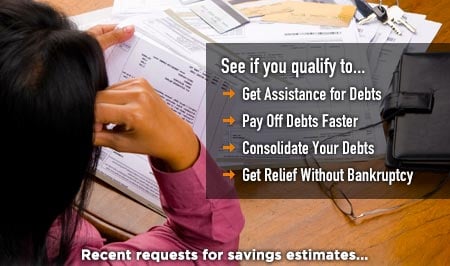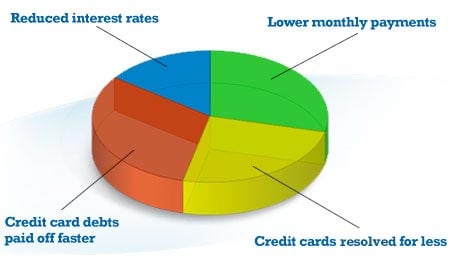
Financial Help
Are you struggling with high-interest credit card debts and falling several months behind on your payments? If so, you're not alone. These days, many residents of Virginia and all across America need help managing not only their finances, but also in managing and reducing their debts from credit cards and unsecured debts like utilities, department store charges, or medical bills. The good news is, if you are currently weighing your debt relief options, there are several options available including debt consolidation, debt settlement, or even bankruptcy.
Also known in the industry as a "debt management plan" or DMP, debt consolidation allows many consumers with debts spread across multiple cards to combine them into a single, more structured, and more manageable payment plan made to a credit counseling agency. On the other hand, debt settlement can allow you to negotiate, or settle, with your individual creditors for a substantially reduced amount of their original debts. Both debt relief methods have become popular alternatives to bankruptcy which has a more damaging and longer lasting impact to personal credit.
To get financial help from caring debt professionals and start exploring your debt relief options, answer a few, simple questions and get a free debt relief analysis and savings estimate. Start Online
Benefits of Debt Consolidation
The term "debt consolidation" represents a wide variety of debt relief options in the industry. But what it actually refers to is the process of combining, or "consolidating," debts spread across multiple cards into a single, more lenient, and more structured monthly payment made to a credit counseling agency that, in turn, distributes funds to creditors. When you enroll in a debt consolidation program, credit counselors review your outstanding debts, and review how much money you can reasonably dedicate each month to paying down your debts.
If credit counselors determine that debt consolidation may be the right plan or program for you, they typically develop a personalized debt-reduction strategy and submit proposals (on your behalf) to creditors asking for reduced interest rates, or waiving or elimination of any late fees or penalties. Creditors that agree to the proposals are placed into the debt management plan.
The goal with debt consolidation is to provide you with a single, more predictable, and more affordable payment plan one that can direct more of your payment towards paying off the principal of your loans rather than just the interest. If followed faithfully, a debt consolidation program can help reduce your debts sooner than if you only continued making the monthly payments on your credit card debts at higher interest rates.
Debt Settlement Alternative
For many consumers who simply cannot afford to pay the full amount of their debts, debt settlement can typically allow them to negotiate with creditors for a reduced amount of what they originally owe. For many consumers, debt settlement or negotiation can offer an honest and legal way to pay back their debts without declaring bankruptcy.
Keep in mind, however, the potential risks involved: When you enroll in a debt settlement program, your credit score will typically decline because when you settle your debts, it usually involves "falling behind" on your payments in order to set aside funds that can be used to make a settlement offer (or a lump sum payment). In addition, as you fall behind in making payments, you can also face legal action for, essentially, defaulting on the terms of your credit card agreements.
But, in spite of all these risks, debt settlement has become a popular alternative for many consumers who want to avoid declaring personal bankruptcy.
Advantages and Savings of Consolidating Debts
Each individual's debt situation is unique, and sometimes, finding a reasonable way to eliminate or reduce your debt may seem like an insurmountable task especially if you have lost your job or your debts have gotten out of control. But regardless of the reasons why you have spiraling debts, debt consolidation may be able to help manage your debts and potentially lead to savings.
The amount of savings that you can potentially get, every month, depends on the following: How much you owe, the current interest rates that you are paying, and any late fees or penalties. Keep in mind that with a debt consolidation program, you will be provided a more structured and more lenient repayment plan that can help you pay off your debts sooner than if you only continued to make the minimum monthly payments and at a pace that you can manage.
That's why it is a smart move to find out how debt consolidation can help you reduce your debts and give you the financial help you need to get back on track. Request a free debt relief analysis and savings estimate now to get you started it's free and it only takes minutes!





















